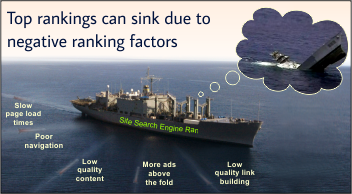Date Published: 19-Jan-2013 | By: Nancy R Jones
Ranking in the first few slots of a search engine result pages (SERPs) is critical to the visibility of a website. In the present business environment, a company or its products will reach potential customers only when their website is visible in the first page of SERPs, for targeted keywords.
Optimizing the website in such a way that it gets indexed easily and is displayed by search engines for the targeted keywords is critical for businesses’ websites. Besides keeping a note on the positive things that enable the website rank well in the SERPs, it is imperative to know various factors that negatively impact the rankings. This article discusses factors that significantly impact search engine rankings.
 Slow page load times
Slow page load times
Search engines consider user experience while ranking a website. If a website loads slowly, it irritates users and gives them a bad user experience and will therefore be considered by search engines to be poorly maintained. This will obviously have a negative impact on search engine rankings.
Make sure that each web page of your website is loading within ideal time. Ideal time for a website is the time to load the webpage which currently is less than nine seconds. Make use of free online tools provided by search engines like Google that help you track the page load time of your website. Page load time can be corrected by removing unnecessary images, videos and heavy design elements from the website, and by reducing the usage of Flash and Java script in the website.
Poor navigation
Poor navigation impairs user experience. When your website has poor navigation, it makes it difficult for the user to find what s/he is looking for and as a result s/he may skip to another website. Further, it becomes difficult for the search engines to crawl the pages in the website.
To avoid poor navigation, make sure that your website is designed in such a way that it is easy to use and navigate.
Low quality content
This is one of the major factors that significantly impact search engine rankings of a website. If the content in the website is of low quality, that is, if it is shallow, plagiarized, contains spelling and grammar issues, is stuffed with keywords, contains hidden texts, and issues that affect the quality of the information, search engines consider it to be of low quality and hence give poor rating.
Therefore, the content on the website should be well written, be of good quality, unique, informative, and should engage the audience.
More ads above the fold
Featuring too many ads ‘above the fold’ of a website will give a negative impression to search engines. The part of the webpage that is visible in the browser is ‘above the fold’.
When ‘above the fold’ part of the webpage is dominated by too many adds, it will badly impact user experience and search engines penalize such websites.
Low quality link building
Building too many irrelevant links in order to get back links will result in poor search engine rankings. Further, purchasing links, and involving in link spams will also have the similar impact. Search engines easily identify such practices and penalize the website.
Providing good quality, informational content on the website naturally attracts quality back links and increases visitors to the website. You can also try submitting articles in reputed article directories to get high quality back links to your website.
These factors impact search engine rankings negatively. Minimizing their influence ensures optimal search engine rankings.
You may also like to read:
